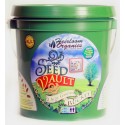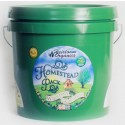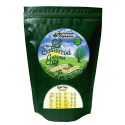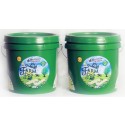Details
 Agrimony Agrimonia eupatoria
Agrimony Agrimonia eupatoria
Agrimony was introduced to the Americas from Europe, where it has had a long history of use dating back to the Romans and ancient Greeks. These cultures, and other Mediteranean peoples, prized Agrimony for an array of medicinal uses, including wound healing, asthma and as a sedative. During the Middle Ages, this unique herb was revered for its supposed magical qualities, and later on preeminent English herbalist Nicolas Culpepper also touted the healing virtues of Agrimony. After introduction to North America, Agrimony gained a reputation for alleviating symptoms of fever with native peoples.
 Artichoke Cynara scolymus
Artichoke Cynara scolymus
Though the culinary applications of this bulbous vegetable are well known, Artichoke has enjoyed a long tradition of medicinal use extending back to the early Greek cultures. Even today the healing virtues of Artichoke remain relatively obscure. The strong bitter qualities of artichoke leaf are said to enhance digestion by stimulating the release of bile from the liver, potentially providing a safe and natural remedy to elevated serum cholesterol levels.
 Ashwagandha Withania somnifera
Ashwagandha Withania somnifera
Ashwagandha is regarded as one of the great rejuvenative herbs of India. According to Ayurveda, the traditional healing system of India, the root of this low-growing shrub is said to be effective for a host of debilitated conditions, including general weakness, impotence, infertility, and others. Ashwaganda is sometimes described as “Indian Ginseng” for the significance of this botanical in Indian pharmacopoeia.
 Astragalus Astragalus membranaceus
Astragalus Astragalus membranaceus
Native to China and Mongolia, Astragalus is revered in Chinese medicine for its reputation as an immune strengthening tonic. It is said to augment the body’s natural reserves and flow of energy (qi), potentially finding success with a number of deleterious conditions from slow metabolism to general debilitation. Astragalus is rapidly gaining popularity in the West, and is often included in blends with other medicinals to promote recovery in times of stress or illness.
 Holy Basil Red & Green Ocimum tenuiflorum
Holy Basil Red & Green Ocimum tenuiflorum
Revered in India as a sacred plant, Holy Basil, or Tulsi, is believed to help bring purity and serenity to the heart and mind. The medicinal virtues of Holy Basil are no secret to modern herbalists, who consider it to be a safe but effective adaptogen capable of alleviating stress and strengthening the nervous system. Fast growing with beautiful multicolored leaves, Holy Basil is a welcome addition to the intrepid herbalist’s garden.
 Wood Betony Stachys offcinalis
Wood Betony Stachys offcinalis
Once widely revered, Wood Betony is once more rising to prominence following a period of relative obscurity over the last few centuries. Both the Greeks, Romans, and later European cultures valued Wood Betony for its mild bitter and astringent qualities. An old Spanish saying 'He has as many virtues as Betony’, shows the esteem in which Betony was held in centuries past. Wood Betony was said to provide protection from curses, and assist with the exorcism of bad spirits. Today, Wood Betony is sometimes used to relieve headaches, neuralgia, stomach and abdominal problems, bloating, heartburn, and gas.
 Borage Borago officinalis
Borage Borago officinalis
Borage is originally native to southern Europe and the Mediterranean, and has a long and noble history as both and medicinal and herb of lore. Once known as the “herb of courage”, Borage flowers were used to decorate the vestaments of departing crusaders. A wine prepared from Borage is said to bestow courage and fearlessness upon the imbiber, and was often given to soldiers before entering battle. In modern herbalism, Borage is said to be effective against weak or diminished adrenal function, fevers, inflammation, sore and inflamed eyes, colds, bronchitis, chronic catarrh, congestion, pleurisy and fever.
 Burdock Aritcum lappa
Burdock Aritcum lappa
Burdock has a long history of use as a detoxifying herb, and is said to have a strong affinity for the blood. It is also regarded as a diuretic, flushing excess water from the body. Over the centuries, it has been used as an antidote in cases of acute poisoning, fungal and bacterial infection, and parasites. Common preparations of burdock include decoction, tincture, and food source.
 Catnip Nepeta cataria
Catnip Nepeta cataria
Native to the Old World, and with a record of usage dating back more than 2000 years, Catnip also became a popular medicinal herb of numerous Native American peoples, who found value in the treating cold, flus, pneumonia and colic. A favorite of felines, in whom it elicits a state of euphoria, today Catnip is often used as a bedtime tea for its ability to calm the mind.
 Cayenne Capsicum annum
Cayenne Capsicum annum
Peppers are among the world’s longest plants, with a history extending back nearly 7000 years. Fossil records indicate that hot peppers have been consumed by humans even longer, nearly 9000 years. Today, Cayennes and other hot peppers are the cornerstone spice of many different cuisines across the globe, and within the last few centuries it has gained much traction in the world of medical herbalism. Regarded by some as a ‘cure-all’, and rich in vitamin content, Cayenne is most widely regarded as a circulatory stimulant said to strengthen the heart and blood vessels while promoting increased vitality.
 Codonopsis Codonopsis pilosula
Codonopsis Codonopsis pilosula
One of the more common adaptogen herbs of Chinese medicine, Codonopsis root is rapidly gaining popularity for its reputation as “poor man’s Ginseng”. Codonopsis is said to help lower elevated blood pressure, provide additional immune support and replenish the body’s natural reserves of energy (qi).
 Dandelion Taraxacum officinale sattivum
Dandelion Taraxacum officinale sattivum
Though much harangued by some as a common weed, Dandelion has long been recognized for its myriad applications in medical herbalism. The untreated leaves can be added to salads and other dishes and are enjoyed for their slightly bitter quality. Dandelion root is often described as a liver detoxifier thanks to its ability to stimulate bile production. This affinity for the liver and its functioning explain why a host of other health benefits are often ascribed to dandelion root, including: improved digestion and appetite, enhanced mood, and more consistent skin tone.
 Hyssop Hyssopus officinalis
Hyssop Hyssopus officinalis
Hyssop is native to southern Europe and the Mediterranean, and has found application in medicine and magic in these regions and beyond for the last two millennia. In ancient times, Hyssop was thought to provide protection from the evil eye and witches if adorned in the home. Today Hyssop is sometimes used to provide comfort to the upper respiratory system and soothe the sore throat. It is also said to be effective as an expectorant and promote improved circulation and digestion.
 Lavender Lavendula officinalis
Lavender Lavendula officinalis
Native to the Mediterranean basin, in modern times Lavender is prized worldwide for the gentle and soothing therapeutic properties. Although it is commonly utilized for wound and skin healing abilities of the essential oil, Lavender also makes a soothing tea or nervine tincture. A hardy and familiar addition to any herb garden!
 Marsh Mallow Althea officinalis
Marsh Mallow Althea officinalis
Though it is known more for the confectionery marshmallow, which adopted this classical botanical’s namesake, Marsh Mallow was widely used as a medicinal by the Greeks and Romans and other Mediterranean cultures of the ancient world. The botanical name of Marsh Mallow, Althea officinalis, is from the Greek “altho”, which mean “to cure”, underscoring the significance of this handsome herb to Greek healers. Traditionally, Marsh Mallow has been used to soothe coughs, sore throats, indigestion, and as a topical agent it is said to be anti-inflammatory, antimicrobial and wound-healing.
 Milky Oat Avena sativa
Milky Oat Avena sativa
Although Oat Straw in unlikely to elicit the same enthusiasm as other nervine or adaptogen herbs, this humble grain has earned a reputation as an antidote for stress, general fatigue and a host of other nervous imbalances. Milky Oat seeds were recognized by the Eclectic school of herbalism popular in the late 19th century in the United States, and also achieved some degree of popularity in Europe. Widely regarded as one of the safest yet dependable remedies, Milky Oats make a worthy addition to any herbalists medicine cabinet.
 Great Plantain Plantago purshii
Great Plantain Plantago purshii
Native to Europe and tolerant of a wide range of conditions, Plantain has traditionally been used to relieve diarrhea, treat lung conditions, and similar conditions relating to excess bleeding and inflammation. Humble and hardy, Plantain is classified as a diuretic, alternative, astringent and vulnerary and is commonly used topically to assist with burns, cuts, scrapes, bites and other mild external injuries. A mainstay of traditional European Herbalism.
 Solomon's Seal Polygunatum canaliculatum
Solomon's Seal Polygunatum canaliculatum
Solomon’s Seal has been utilized in both New and Old World herbalism for centuries, and has been said to have efficacy in treating a wide range of conditions, including indigestion, constipation, broken bones, external scrapes and bruises, inflammation, and general debility. 16th century herbalist John Gerard attributes the name of this botanical to its reputation for quickly ‘sealing’ external wounds and even broken bones.
 Valerian Valeriana officinalis
Valerian Valeriana officinalis
Popular in the marketplace today for problems relating to anxiety and insomnia, Valerian has been used in Europe for thousands of years. Such properties were recognized by Hippocrates and Galen, and Valerian remained popular following the fall of the Roman Empire. When dried, Valerian root takes on a unique and distinct aroma that is not soon forgotten. Over the centuries, Valerian came to have unusual uses, as in medieval Sweden where new grooms carried Valerian in their wedding clothes to ward off the “envy” of the elves.
 Blue Vervain Verbena hastata
Blue Vervain Verbena hastata
Blue Vervain has a long history of use across Europe and into North Africa and western Asia. The ancient Druids of Ireland considered Vervain to have supernatural powers and held it in high esteem. Other cultures to have included Blue Vervain in their pharmacopeias included the Egyptians, Persians, Greeks, Romans and British. Later on, Dr. Edward Bach included Vervain in his 38 flower remedies to promote balance of body and mind. Blue Vervain has traditionally been used for a wide range of imbalances, including colds, coughs, flus and more.
 Violet Heartsease Viola tricolor
Violet Heartsease Viola tricolor
Though largely forgotten in modern herbalism, the use of Violet extends back hundreds of years, if not longer. Such preeminent healers as Hippocrates and Nicolas Culpeper utilized the moist, cool properties of this botanical in their humoral systems of medicine, finding applications for imbalances of the skin and eyes. Over the centuries, some have also used Violet for problems of impaired digestion such as constipation.
The herbal information on this web site is intended for educational purposes only. It is not the intention of the editor to advise on health care. Please see a medical professional about any health concerns you have.
Disclaimer - These statements have not been evaluated by the FDA. The information on this web site is not intended to prevent, diagnose, treat, or cure any disease.
Due to ongoing seed shortages, seed varieties subject to change without notice. Replacements will be as close as possible and will be included in your order documentation.
You may also be interested in the following product(s)

Seed Vault
$99.00
|

Homestead Pack
$249.00
|

Essential Survival VaultRegular Price: $45.00 Special Price: $35.00 |

Farm Pack
$499.00
|











